
Marine Le Pen in action in the European Parliament. Source: europarl.europa.eu


Marine Le Pen in action in the European Parliament. Source: europarl.europa.eu
Georgia’s debut in the UEFA Euro 2024 on June 18 saw Georgia lose 3:1 to Turkey in a game that many lauded as “one of the best games” they had seen.
Arder Guler, a 19-year-old star, scored an impressive long-range goal to secure Turkey’s win against Georgia in their Euro 2024 opener in Dortmund. Turkey took the lead in the 25th minute with Mert Muldur’s volley, but Georgia equalized through the soul-lifting Georges Mikautadze shortly after.
Despite Georgia’s efforts, seeing two unfortunate near-misses, Turkey closed the match with a third goal, with Kerem Akturkoglu scoring into an empty net during stoppage time.
While Georgian fans were left without a win in the country’s first UEFA match, the game marked a thrilling watch from start to finish, and we can easily say the boys did their homeland proud.
Temur Ketsbaia, the former Newcastle United midfielder and ex-head coach of the Georgian national football team: “I am proud of how the Georgian national team played. We played well and with quality. We are participants in a historic event and I believe we will play even better in the next matches. We passed our first test with flying colors. Thanks to everyone who made this day so memorable!"
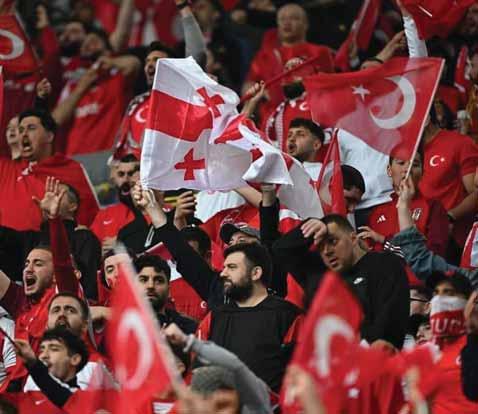
In this week’s issue...
Water Cut in Tbilisi – GWP Says Water Pipe Fix Needs Several Days
NEWS PAGE 2
Foreign Agents Law: Georgian Ministries Received 10 Times More EU Funds Than Civil Society, EU Says
PAGE 4
Lineate’s Vice President Giorgi Tsikolia Joins CAMCA Regional Forum Panel Discussion in Bishkek, Kyrgyz Republic
Championing Inclusive Tourism: An Interview with Tamar Makharashvili
Beso Shengelia - The Nobel Peace Prize Nomination Candidate from Georgia
8
Erasing the Canvas: Tbilisi's Heroes Square Loses Its Vibrant Voice
9
Elisabeth Leonskaja's Musical Alchemy: Beethoven’s Late Sonatas Enchant Tbilisi's Soul
The Georgian Impact on Shaping European Identity: EVROVIZION Touring Exhibition Comes to Tbilisi
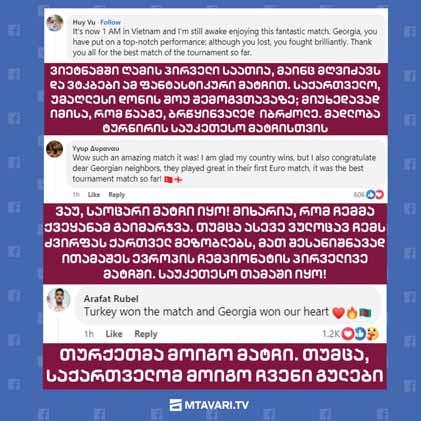
Continued from page 1
Prime Minister Irakli Kobakhidze thanked the members of the Georgian national football team for “playing honorably” and scoring the country’s firstever goal at the European Championship.
The Head of Government attended the national team’s inaugural match at the European Championship in the company of the cabinet members and Tbilisi Mayor Kakha Kaladze.
“A big thank you to the boys for playing so honorably! Thank you for the first-ever goal at the European Championship! Only luck prevented us from collecting one point! Everything is still ahead!” the Prime Minister said.
“The key to Georgia’s recent football success has been investment and a huge change in psychology that saw a shedding of some of the old stereotypes and inse-
curities,” Daniel Boffey wrote in a piece for The Guardian, describing Georgia’s football history (“all a failure until now,” Levan Kobiashvili president of the Georgian Football Federation told him). “We always had good individual players who played for top European clubs, but when we got together, it didn’t click; we didn’t manage to find that team spirit and togetherness,” Kobiashvili tells Boffey.
George Kipiani, technical director at Tbilisi’s club ‘Locomotive’, however, succinctly summarizes the current spirit in Boffey’s piece: “We have a new generation, new energy, with new vision, with new values,” he said. The national team and their fans have been looking forward to Germany for a long time. It won’t always be easy, but they refuse to look back.”
Georgia will be playing Czechia on June 22, and Portugal on June 26.
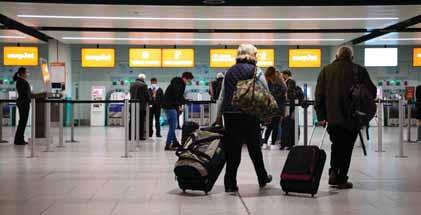 BY TEAM GT
BY TEAM GT
Mandatory health and accident insurance for tourists arriving in Georgia has been postponed until January 1, 2026.
In the third reading, the Parliament supported the amendment to the “Tourism” law, based on which tourists arriving in Georgia will not have the obligation to have health and accident insurance until January 1, 2026.
The draft was presented to the Parliament by the Georgian Dream deputies. In accordance with the Law “On Tourism”, tourists entering Georgia must have mandatory health and accident insurance. The mentioned condition was to have been implemented from June 1, 2024.
 BY TEAM GT
BY TEAM GT
Fixing the damaged water pipe will take several days. At the same time, the company is working on alternative ways to get water to consumers, said Jose Miguel Santos Gonzalez, General Director of the Georgian Water & Power (GWP) Company.
GWP Director General said the company’s employees are working 24/7 to resolve the problem.
“We work 24/7 in three directions to reach the damaged pipe and repair it quickly. We began work last night to remove the land cover. It will take us
several days to approach the damaged pipe and start repairing it.
“At the same time, we are trying to develop alternative pipes to supply water to our consumers. We managed to supply water with a schedule to 63 thousand consumers. The water will run from 7 a.m. to 10 a.m. and from 7 p.m. to 10 p.m. We have 15 reservoirs available to deliver water to the places where we cannot supply water through the system,” he said.
For more than two days, part of the population of Tbilisi and Mtskheta had no water. More than 60,000 subscribers, about 300,000 people, today remain without water. Taking into account that the air temperature in Tbilisi these days has reached 35 degrees and also that the
active tourist season has started, lack of water creates particularly big problems.
GWP reports that the quality of drinking water in the distribution network of the capital fully complies with the norms established by the national regulations and is safe for human health.
“Difficult technical works are being carried out to fix the damage to the central main water supply pipeline near the village of Tsitsamuri. Until the damage is repaired, Tbilisi’s water supply system is working in emergency mode.
“During the restoration of the water supply, the water may have a different color during the first few minutes, which is caused by frequent changes in the water pressure in the network,” reads the information.
Integration into the European Union requires unanimity, and we all have already heard several member states publicly stating that they will oppose opening accession negotiations with Georgia” –said EU Ambassador to Georgia, Pawel Herczynski.
As the initiators of the project explain, a number of issues were identified during the development process of the resolution “On approval of the rules and conditions of mandatory health and accident insurance for tourists entering Georgia”, which made it appropriate to suspend the corresponding requirement of the law until January 1, 2026.
“It is clear that the private sector needs additional time to adapt and is not ready for the expected changes at this stage.
“The introduction and implementation of new regulations requires a multi-stage preparatory process, including proper informing of the private sector, as well as embassies and consulates of foreign countries, conducting information campaigns and carrying out other relevant measures, which will effectively help the sector in the process of adapting to the aforementioned changes,” the explanatory note of the draft law states.
The Ambassador noted that the EU, next week, will decide about the consequences if the law on ‘Transparency of Foreign Influence’ is enacted.
“When it comes to EU-Georgia relations, with huge regret, I have to tell you that we are currently undergoing a difficult period in our relationship. We have said repeatedly that enacting the law on foreign influence would adversely affect Georgia’s EU aspirations. Unfortunately, this has happened,” he said.
“Next week, the European Union will discuss the consequences. Discussions will happen first at the level of foreign ministers, and several days later at the level of the leaders. The presidents and prime ministers will discuss and decide what measures we will take in response to the events in Georgia.
“For sure, the prospects of Georgia moving forward have been adversely affected. Basically, the adoption of this law, as I see, has frozen Georgia’s EU
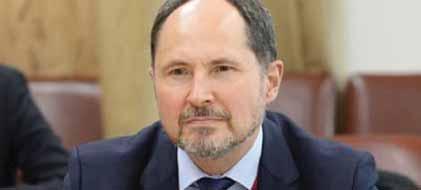
integration. As you know, integration into the European Union requires unanimity, and we all have already heard several member states publicly stating that they will oppose opening accession negotiations with Georgia if this law is enacted. It has been enacted, and consequences will be decided next week,” he said.
When asked what measure the European Union will consider taking against Georgia after the enactment of the law, Pawel Herczynski said:
“I cannot pre-empt the discussion that will happen next week among foreign ministers and then among prime ministers, presidents. We need to wait what measures will be chosen by member states and what measures will be implemented. What I can say is that, as the European Commission and European External Action Service, we have pro-
vided a menu to member states and it will be for the member states to decide what measures from that menu will be chosen,” he said.
When asked whether the EU is also thinking about imposing visa restrictions like the US did, the Ambassador answered that the tools that the EU might employ are different from the US.
“The United States is a close and likeminded partner of the European Union. We tried to coordinate our positions across all the issues. However, we are very different. And the instruments that we can employ are very different for obvious reasons. The European Union is an inter-governmental institution of 27 sovereign countries. Sometimes the US acts much quicker than we do. Again, we coordinate, we share information, but our actions are rarely identical, and they don’t need to be so,” he said.
AsRussianPresidentVladimir
Putin arrived in North Korea, his visit underscored the vital role North Korea plays in supplying arms to Russia in its war with Ukraine.
Putin was given a red-carpet welcome by Kim Jong Un when he touched down on the tarmac before dawn. And the North Korean leader was there to wave him off when he departed.
The most significant development of the trip was the signing of an accord in which Putin and Kim agreed to support each other if either country was dealing with "aggression".
Kim said he fully supports Russia's invasion of Ukraine, and also called Russia North Korea's “most honest friend.” Putin described their meeting as a "breakthrough," and thanked Kim for his “consistent and unwavering support for Russian policy, including in the Ukrainian direction.”
During his visit Putin was treated to a lavish formal ceremony featuring singing children, military walks and a parade through the streets, with a state reception and gala concert later in the day.
FIGHTING UPDATES, DAY 846
At least two people were injured and residential buildings were damaged in Ukraine’s western region of Lviv after a wave of Russian drone attacks targeted energy infrastructure over six regions of the country. The air force said it destroyed 19 out of 21 drones launched by Russia.
Ukraine’s military said Russian forces had “intensified” their assaults near Toretsk on the front line in the eastern Donetsk region and had “launched five assault operations at once,” targeting surrounding towns and villages. The Russian Ministry of Defense said its forces had “improved” their positions around Toretsk, which had a population of about 32,000 people before the war.
Rostov regional governor Vasily Golubev said a fire caused by a Ukrainian drone strike on an oil terminal in southern Russia continued into a second day despite firefighters’ efforts to extinguish the flames. The facility was struck on Tuesday.
Viktoriia Litvinova, Ukraine’s Deputy Prosecutor General, said the country had created a national registry to document cases of sexual violence allegedly committed by Russian forces. Litvinova told The Associated Press news agency that 303 cases of conflict-related sexual violence had been registered since Russia began its full-scale invasion, with 191 cases involving women and 112 involving men.
POLITICS AND DIPLOMACY
Following North Korea, Putin travelled to Vietnam. In an opinion piece to coincide with the visit, Putin applauded Hanoi for supporting “a pragmatic way to solve the crisis” in Ukraine. Vietnam has not condemned Russia’s attack on Ukraine, but has built alliances with the United States, its biggest export market, and the European Union.
WEAPONS SUPPLY NEWS
Mykhailo Podolyak, a senior Ukrainian presidential aide, said North Korea was

“actively cooperating” with Russia militarily, and called for greater international isolation of both countries. “There is no doubt that North Korea … deliberately provides resources for the mass murder of Ukrainians,” he told the AFP news agency. United Nations sanctions monitors, in their last report before Russia blocked the renewal of their mandate, said North Korean missile fragments had
been found in Kharkiv.
In a Dallas warehouse, the Pentagon's first major arms plant set up since Russia's Ukraine invasion, sees Turkish workers, using robots and lathes from Istanbul-based defense firm Repkon, manufacturing 30,000 steel shells monthly for the 155-millimeter howitzers crucial for Kyiv's defense. Ukraine fired 4,000 to 7,000 shells daily in 2023, but political disputes delayed Pentagon shipments until April's $61 billion aid package. To meet demand, the Pentagon aims for 100,000 shells monthly by 2025. Scranton, Wilkes-Barre make 36,000 and this new factory, General Dynamics in Mesquite, is set for 30,000 a month at full capacity. This target represents a nearly tenfold production increase.
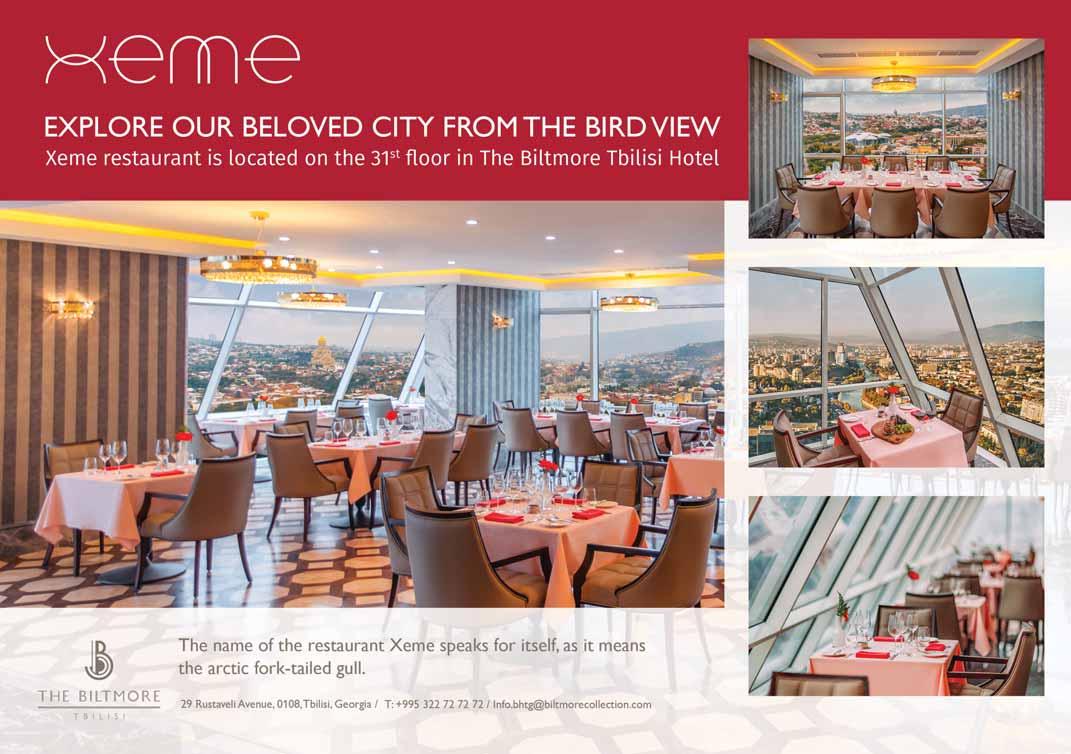
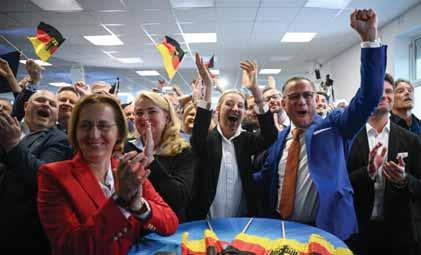 INTERVIEW BY VAZHA TAVBERIDZE
INTERVIEW BY VAZHA TAVBERIDZE
Thisweek,RadioFreeEurope/ RL’s Georgian Service sat down with Daniel Foubert, Polish-French geo-economist, and founder of the international affairs consultancy Excalibur Insight, to discuss the European Parliament elections and the fallout for France, Germany, the EU, and Georgia.
LET’S BEGIN WITH THE WINNERS AND LOSERS OF THE EP ELECTIONS – THE FAR RIGHT CLAIM IT WAS THEIR VICTORY, BUT HOW BIG A VICTORY ARE WE TALKING?
If you look at the seats in the parliament, it doesn’t translate into a significant change. The biggest change was that Marine Le Pen’s ID group got about 20 more seats, and that’s no way enough to clinch a majority. Von Der Leyen will probably be supported by ECR and Meloni, and she is not really a “far right,” is she? She’s a conservative and a kingmaker; she’s in the middle of everything. With that in mind, the victory that the
far right claims won’t change much, it will just give them a bit more clout at negotiations.
But I think the big change is not at the level of the European Parliament. The biggest change, which will also affect the EU itself greatly, was at the national level - in France, where the elections produced a major political tsunami, one that I think will lead to the end of the Macron government. In each and every poll, their situation is worsening, and in the best case scenario, they will be forced to make an alliance with either the far right or left. I don’t even know how such a government would work, and this will affect them at both the national and EU level. Take the Ukraine war, for example. In all matters pertaining to Ukraine, now there will be a huge factor of Marine Le Pen being pro-Russian. And yes, I do remember she changed her stance several times. She did say the French shouldn’t blush about sending weapons to Ukraine, but a few months earlier, she was adamant France shouldn’t be involved at all. She only changed her tune once she saw it was going to happen regardless, so I don’t believe her and neither should anyone. An equally disastrous scenario would be the Macron government align-
ing with the left – the French far-left is extremely pro-Russian, maybe more so than Le Pen. They are "anti-imperialist," with a very specific meaning. For them, it means anti-USA, anti-NATO, antiWestern power. Western colonialism is bad, Russian colonialism is ok – the deeply rooted French communist tradition is probably also a factor in this perception.
HOW WOULD YOU INTERPRET MACRON’S DECISION TO CALL SNAP ELECTIONS? WHAT DOES HE WANT TO ACHIEVE?
Pretty much the same thing that Chirac achieved in 1997. He wants to give away the government, the problems, the responsibility, and subsequent blame to someone else. He can’t run for President for a third time, but he will stay on for another three years, and he is clever – he knows that’s more than enough time to destroy an opposition that has zero actual experience of governing the country. He will give them the keys to the country, and they will make a complete mess out of it. And then people will say, “hey, it wasn’t that bad when Macron and his people were in charge, they were in fact the good times.”
But this domestic political tsunami will also mean that the EU too will be a complete mess, without France, which will be pre-occupied with domestic matters first and foremost. Whether you like Macron or not, he had direction; he knew how to use the resources of his country in European matters; he had the European project in mind. Now there will be conflict, France will be all about national interests at the cost of any international cooperation. I have no idea what cooperation Le Pen might be interested in.
ON TO GERMANY, WHERE WE SAW CHANCELLOR SCHOLZ’S SOCIAL DEMOCRATS SUFFER A CRUSHING DEFEAT. HOW WILL THAT TRANSLATE INTO GERMANY’S DOMESTIC AND FOREIGN POLICY?
Scholz is going to have huge problems,
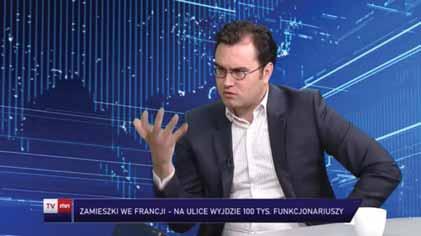
because his coalition is very weak and getting even weaker. From the point of view of the foreign policy, Scholz has lost much of his credibility as a political leader; he isn’t seen as the face of Germany. He failed pretty much at everything he set out to do. He didn’t want to support Ukraine, systematically does everything he can to drag his feet and avoid sending more weapons, and yet, each time he gets pressured by Germans at home and partners abroad and has to do it regardless.
WHAT IMPACT WILL ALL THIS HAVE ON THE UKRAINIAN WAR EFFORT AND THE EUROPEAN ASSISTANCE?
Again, a lot is going to depend on what’s happening in France. Is Le Pen going to behave like Scholz? Saying no at first, hesitating, but in the end, consenting? Or is she going to be a firm “No,” like Orban in Hungary? If I were to guess, I think the first option is more probable than the second, because once you are in power, you end up with a different strategy, with responsibilities. When you are in the opposition, you criticize, which is easier and has no cost attached. Once Le Pen is actually responsible for decision-making, and has to accept all responsibility for it, then I suspect she’ll sing a different tune.
AND THE IMPACT ON GEORGIA? WITH THE FAR RIGHT ON THE RISE, WILL IT MEAN LESS STAUNCH SUPPORT FOR DEMOCRATIZATION, AS OPPOSED TO MORE LEEWAY TO AUTHORITARIAN, ANTI-WESTERN RHETORIC LIKE THAT OF GEORGIA’S CURRENT GOVERNMENT?
At first sight, the outcome of the elections could lead in one of two directions: Either the moderate parties will step up their support for Russia's opponents to combat the Russian networks that support their own opponents, or they will try to woo the extremes by moderating their support. I think the Europeanist parties have come to understand (as Emmanuel Macron has), that no compromise or moderate strategy is possible, and that they must not cede any more ground to Russia, which is waging a relentless war against them. The European Parliament, which has functioned on the basis of a consensus between the three major groups in the center, will continue to work with the European Commission, as it has up to now. So the question is once again whether the European Union's support for the democratization of Georgia and Moldova will be blocked or not by France, which could act as Russia's Trojan horse far worse than the Chancellor.
The EU Delegation to Georgia has published data on EU support to the country “to clarify in context of the Law on Transparency of Foreign Influence”.
The data shows that the ten largest beneficiaries of 2019-2024 assistance – Georgian ministries and state agencies – received the most financial support from the EU in Georgia.
“Ministries were allocated 10 times more funds than civil society,” a Facebook post by the EU Delegation to Georgia says. According to the EU Delegation, from 2019, the Ministry of Regional Development and Infrastructure and local governments have received €111.55 million from the EU. The EU has allocated €101.4 million to the Georgian Finance Ministry and €62 million to the Defence Ministry. The Ministry of Environment and Agriculture and its agencies received €57 million. The Georgian Parliament has received €4.8 million from the EU, coming 11th on the list of beneficiaries. Altogether, the Georgian public sector received €517.82 million from the EU, including €75 million in support during the COVID19 pandemic. The EU has allocated €46.1 million to Georgian civil society and €6.1 million to the country’s private sector.
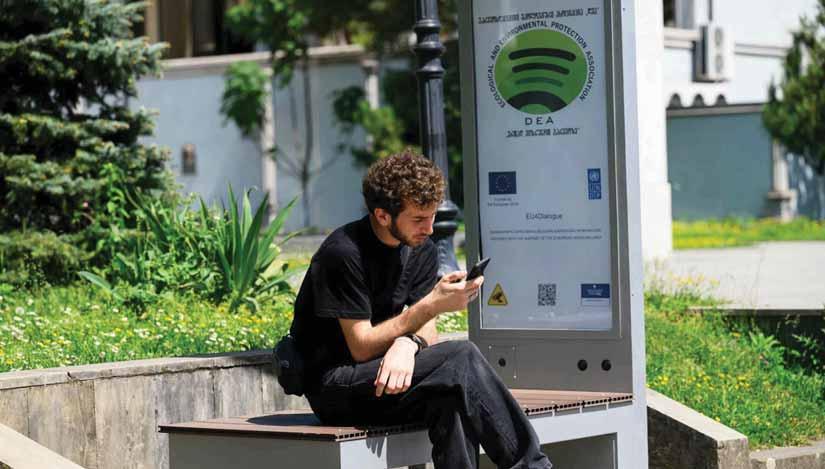
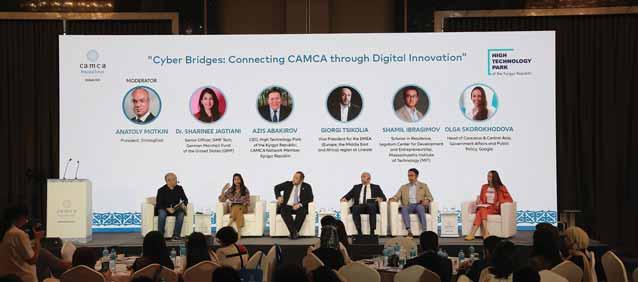
Lineate's Vice President, Giorgi Tsikolia, recently participated in a panel discussion at the CAMCA (Central Asia-Mongolia-Caucasus-Afghanistan) Regional Forum in Bishkek, Kyrgyz Republic. The forum, held on June 12-13, aimed to bring together leaders and professionals from the CAMCA region and the United States to discuss economic growth and development strategies. The CAMCA Regional Forum, established as a non-political and non-partisan initiative, seeks to promote dialogue and collaboration among young leaders and professionals from Afghanistan, Armenia, Azerbaijan, Georgia, Kazakhstan, Kyr-
gyzstan, Mongolia, Tajikistan, Turkmenistan, and Uzbekistan. The event, organized by the CAMCA Network, Central Asia-Caucasus Institute, and the Rumsfeld Foundation, focuses on fostering regional cooperation in geopolitics, entrepreneurship, and digital transformation. Lineates' participation in the panel discussion alongside representatives from Google, MIT, and the German Marshall Fund emphasized the role of the private sector in advancing regional economic initiatives. The forum explored various critical focus areas under the theme 'Uniting CAMCA: Progress and Possibilities,' including regional coordination, transportation corridors, women's
empowerment, investment opportunities, and education. The diverse lineup of speakers, including CEOs, ambassadors, ministers, and academic leaders, provided a comprehensive perspective on the current landscape and future opportunities for the CAMCA region. Since its establishment in 2014, the CAMCA Regional Forum has become a significant annual gathering, attracting over 1,400 participants from 33 countries worldwide. It serves as a platform for exchanging ideas, forging partnerships, and exploring avenues for sustainable development across the expansive CAMCA region. The participation of leaders like George Tsikolia underscores
the forum's role as a catalyst for positive change in the CAMCA region.
The forum in Bishkek reaffirmed its role as a pivotal platform for regional cooperation and set the stage for transformative initiatives that promise to impact the CAMCA region and beyond for years to come.
About Lineate: Lineate is a leading implementer of cloud solutions, helping organizations scale their technology to manage vast data volumes and user bases. Our expertise in distributed systems, along with our unique culture focused on knowledge breadth and creativity, sets us apart in a competitive industry. With a global presence spanning seven countries, our client base is primarily in the United States and Western Europe.
About Giorgi Tsikolia: Mr. Giorgi Tsikolia is the Vice President at Lineate, a top U.S. cloud solutions implementer with a global presence in seven countries. At Lineate, Giorgi drives business growth and expands operations in the EMEA region.
In addition to his role at Lineate, Giorgi is the Vice President of the AmericaGeorgia Business Council. He advocates for policies that promote economic ties between the United States and Georgia and is also a member of the Board of Advisors at Geocase, a nonpartisan think tank that focuses on Georgian geopolitical priorities.
Giorgi Tsikolia is an alumnus of The Fletcher School of Law and Diplomacy at Tufts University.
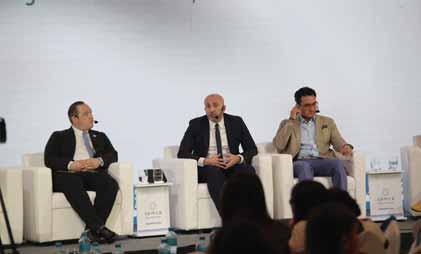
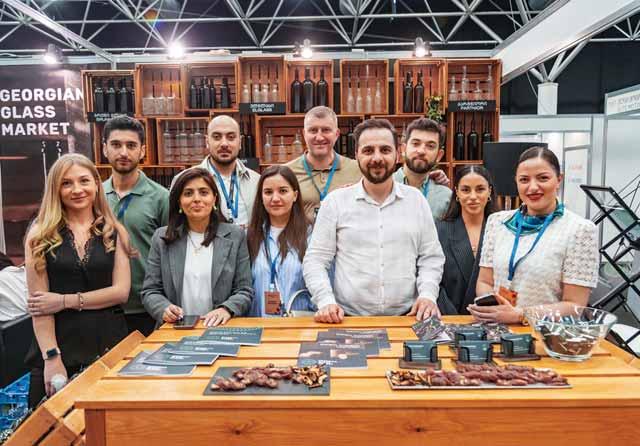 BY MARIAM MTIVLISHVILI
BY MARIAM MTIVLISHVILI
Georgian Glass Market is one of the largest importer companies of glass tar and packaging materials in Georgia. The company focuses on providing Georgian manufacturers with a comprehensive range of glass products and reliable, convenient services. To learn more, GEORGIA TODAY spoke with Tea Gorozia, Marketing Director of Georgian Glass Market.
WHAT WAS THE PURPOSE BEHIND CREATING GEORGIAN GLASS MARKET?
Georgian Glass Market was established in Georgia in 2021 and has quickly grown to become the leading importer of glass jars and packaging materials in the market. Our founders established the company based on their extensive experience in the wine business sector and their deep understanding of market challenges and solutions. The company was created to simplify the operations of Georgian entrepreneurs and assist them in the production of wines, Chacha, brandy, and soft drinks. We are a company focused
on growth, constantly expanding our product range and enhancing accessibility to our services.
WHAT PRODUCTS DO YOU OFFER CUSTOMERS, AND WHAT MAKES YOUR COMPANY UNIQUE?
We provide our partners with glass containers and a complete range of materials necessary for molding and packaging. Georgian Glass Market distinguishes itself with competitive pricing, prompt delivery services, and flexible payment options. Our priority is ensuring swift and convenient supply of glass jars and
molding materials to Georgian manufacturers, allowing them to focus extensively on their core task – creating and developing their products.
YOUR COMPANY PARTICIPATED IN WINEXPO GEORGIA 2024. COULD YOU SHARE MORE ABOUT THIS EXPERIENCE?
From June 7-9, Georgian Glass Market showcased its full range of glass tar and packaging materials at the 16th International Exhibition of Wine and Spirits. This event was crucial as it provided both existing and prospective customers with an in-depth look at our products. During the expo, we garnered significant interest from numerous manufacturers.
WHAT ARE YOUR FUTURE
We are committed to further expanding our company, forging new partnerships, and meeting the evolving needs of our partners to the fullest extent possible. Consequently, we anticipate becoming the leading importer of glass jars in the Georgian market in the near future.

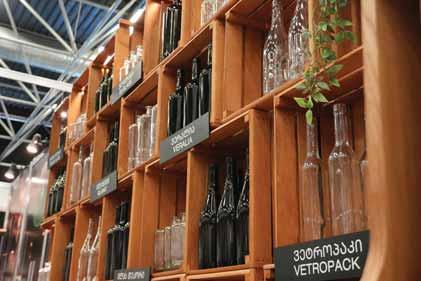
There goes a young man in Sakartvelo, whose candidacy for the nomination of Nobel Peace Prize is known to far too few of us. As honest and considerate people, we need to speak as loudly as we can about this wonderful fact, so that we don’t miss out on something both useful and very, very interesting. Beso Shengelia’s unbridled enthusiasm for doing good things without seeking remuneration, his enviable physical fitness and natural acumen for invention, his sincere readiness to help people, and his educational assets are so valuable for this nation that his name and deeds have to be better known, both within this nation and beyond.
To start with, Beso Shengelia was a brilliant player in Georgia’s junior rugby team of 2009-10, but, for health reasons, had to retire at the age of 19, though he never gave in. A couple of years after this negligible-for-his-character predicament, he prepared his back-pack and set out on a long journey from Tbilisi to Kazbegi (Stepantsminda), where the inveterate optimist, full of enthusiasm, determination and vigor, created the first-ever children’s rugby team, thus making friends with the entire youth of the region. And not
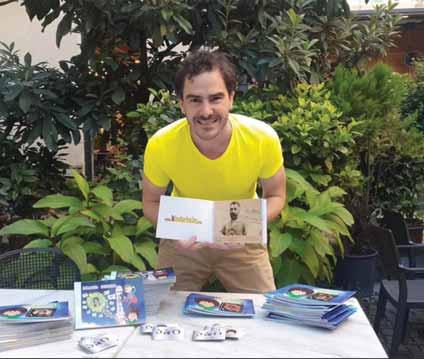 Shengelia. Source: IG
Shengelia. Source: IG
only that! Beso initiated non-formal educational classes of English and math for the local kids, all for free. Money was not an issue – he made it by working as a waiter in the renowned Kazbegi Rooms Hotel restaurant, and asked for not even a dime to help him out, putting it all toward the local boys and
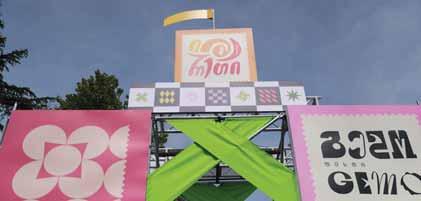
Kutaisi hosted the annual GEMO FEST. Organized by the Georgian National Tourism Administration, the gastronomic festival is held in Imereti. In Kutaisi, in Veriko Anjafaridze Square, food spaces, business and wine market and entertainment spaces were organized. More than 20 entrepreneurs and cooks from Imereti participated in the festival.
The Georgian National Tourism Administration noted that the goal of the festival is to promote local cuisine in the regions, support entrepreneurs/families, and increase the flow of domestic and international travelers.
girls, denying its use for his own daily comfort.
Beso Shengelia’s story was presented on Imedi TV, and he was named winner of the 2013 television competition prize, ‘The Imedi Heroes.’ And, in 2015, the World Rugby Federation created a documentary about him, which was shown
in more than 50 countries, introducing his name to hundreds of thousands of viewers throughout the world.
As his climb to the top continued, Beso did not waste his valuable time: In the Adigheni region of south-western Georgia, he organized and provided for the construction of a sports and cultural center, which resulted in a very specific outcome – training several future prize winners of the European and World championships in wrestling.
Soon after this, the inexorable Shengelia started experimenting with a unique educational methodology (www.KinderBubu.com) for students of the three to twelve age bracket: The illustrated book of adventures, and alphabet-teaching photo-personal motivational book of methodology, creates shared childhood memories and promotes friendships with the future generations of the world, notwithstanding national, religious or any other cultural differences. This was all followed by several TV shows and just as many newspaper and magazine articles.
After this, Beso’s independent activity to the benefit of this society demanded further augmentation, and not only within this country. As the stars aligned to assist his good works, there came around a new opportunity to invest his talent and wits: The company named Blue Origin, belonging to the famous Amazon owner Jeff Bezos, showed readiness for sym-
bolic cooperation with Beso Shengelia. And finally, a cultural exchange between Disney headquarters and Georgia! Now far more than just a “citizen of Georgia,” indeed, a writer, inventor, researcher, economist, linguist and fighter for peace, Beso Shengelia is currently working on two outstanding missions: First, an educational project, comprising elements of the initiation of peace in the world; and, second, an annual international family festival in Georgia, which will be inaugurated in 2025 under the title ‘The Annual Peace Forum in Georgia,’ inspired by Nobel peace status symbolism. Amazingly and interestingly, the members of Donald Trump's team have expressed a desire to participate in the convention as honorary guests. Isn’t this much too much for a man of only 31 years of age? And within just several years? But Beso Shengelia knows exactly what he is doing and why, and the Nobel Prize nomination is not the end goal in itself, but an incentive to carry on with great and noble works for peace in the world against all the extant odds, including the wars in Ukraine and the Middle East, and the presumed incipient conflict in Taiwan.
The world definitely needs young and reasonable men like our Beso Shengelia, truly Georgian in form and spirit, but very international in his action and understanding of the world around. Let’s wish him well!
Lasha Khutsishvili, Minister of Finance of Georgia met with members of the Slovak Republic’s government delegation.
The delegation visiting Georgia included the country’s Deputy Prime Minister and Minister of Economy, Denisa Saková, Minister of Finance, Ladislav Kamenický, President of the National Bank, Peter Kažimír, General Director of EXIM Bank, Rastislav Podhorec, and Slovakia’s Ambassador Extraordinary and Plenipotentiary to Georgia, Matúš Bušovský.
Ministry of Finance of Georgia stated that during the meeting held at the Ministry of Finance, the parties discussed current issues in trade-economic and investment relations between the two countries, as well as prospects for future cooperation.
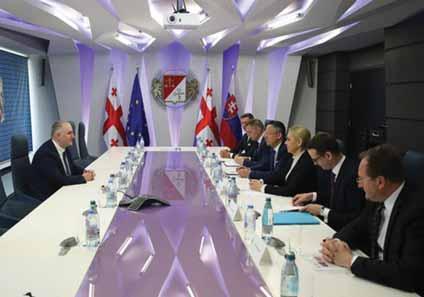
From July 1, full-time teachers, regardless of their status, will see their salaries increasing by 500 GEL on average, – the Minister of Education of Georgia, Giorgi Amilakhvari, announced midJune.
The minister noted that taking into account the principles of justice and the need for a transparent remuneration system, the salary policy of teachers is being changed, as a result of which there will be an unprecedented increase in the remuneration of teachers.
“With large-scale discussions and the active involvement of members of the school community, for the first time since 2004, a new document of national goals of general education was approved, where the main focus was on the formation and


strengthening of patriotism, national spirit, national identity, state thinking, respect for the family institution, general and universal values in students,” Amilakhvari said.
In addition, the minister said, the improvement of school infrastructure continues throughout the country – the construction and rehabilitation of more than 170 schools is currently underway by the Educational and Scientific Infrastructure Development Agency. Amilakhvari also mentioned that professional education is the most important priority of the Georgian government. He claimed that the implementation of professional programs is starting in 20 public schools, and students of the graduating class will have the opportunity to master their desired profession at school.
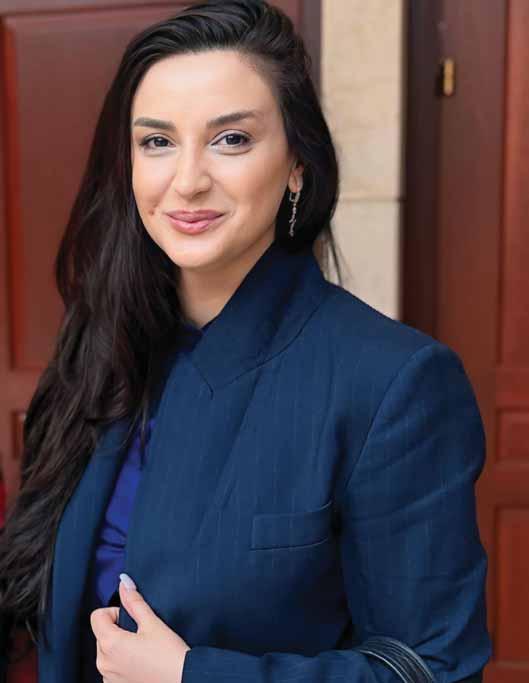 INTERVIEW BY MARIAM MTIVLISHVILI
INTERVIEW BY MARIAM MTIVLISHVILI
Over the years, Tamar Makharashvili, an Inclusive Tourism, Universal Design, and Accessibility Audit Expert, PhD candidate, has dedicated herself to advocating for equal opportunities within the tourism industry, both in her home country of Georgia, and internationally. As the founder of the NGOs Inclusive Tourism Center (ITCP) and the International Institute of Universal Design Research and Education (IIUDRE), she has pioneered efforts to break down barriers for persons with disabilities and integrate inclusivity into the tourism sector in Georgia. In this interview, she shares her journey, achievements, and future aspirations.
“My journey advocating for equal opportunities in tourism began over a decade ago with the establishment of the NGO - Inclusive Tourism Center (ITCP) in Georgia,” she tells us. “Recognizing the substantial challenges faced by persons with disabilities in accessing tourism facilities, I initiated educational programs, conducted extensive research, piloted accessibility projects, and launched advocacy campaigns aimed at fostering inclusivity in the tourism sector. Tourism is pivotal for Georgia's economic growth, contributing to revenue generation, job creation, and cultural exchange. By nurturing an inclusive tourism market, Georgia can attract a diverse range of visitors, including those with disabilities, thereby boosting tourism revenues and promoting social inclusion. Ensuring human rights in tourism entails eliminating barriers and providing accommodations to ensure equitable access to travel and leisure activities for all.”
HOW HAS SUPPORT FROM INTERNATIONAL EXPERTS INFLUENCED YOUR WORK?
The support from international experts has been invaluable. I am grateful to the European Network for Accessible Tourism (ENAT) and its experts, Ivor Ambrose, Katerina Papamichail, and Chris Veitch, whose guidance has been instrumental in introducing international standards for inclusive
tourism and accessibility. Their expertise has also been pivotal in developing educational programs and integrating inclusive tourism into Georgian legislation.
CAN YOU ELABORATE ON YOUR ROLE WITH THE THE GLOBAL INITIATIVE FOR INCLUSIVE INFORMATION AND COMMUNICATION TECHNOLOGIES (G3ICT)?
In 2022, I had the honor of joining The Global Initiative for Inclusive Information and Communication Technologies (G3ict), as a Country Advisor/ Expert on Inclusive Tourism. This role allows me to leverage my expertise in developing international training programs and educational resources on Inclusive Tourism. These initiatives are poised to equip global tourism professionals with the requisite knowledge and skills to create more inclusive and accessible tourism experiences. G3ict – the Global Initiative for Inclusive Information and Communication Technologies – is an advocacy initiative launched in December 2006 by the United Nations Global Alliance for ICT and Development, in cooperation with the Secretariat for the Convention on the Rights of Persons with Disabilities at UN DESA. The mission of G3ict is to build a global community to advance the fundamental human right of persons with disabilities to digital access. The organization supports countries in developing and implementing inclusive ICT policies, providing guidelines, resources, and expertise. G3ict conducts research, publishes reports, and offers certification programs and trainings to empower organizations in creating accessible ICT solutions. By collaborating with global entities and promoting international standards, G3ict advocates for a more inclusive digital environment.
YOUR CONTRIBUTIONS HAVE BEEN RECOGNIZED WITH PRESTIGIOUS AWARDS. CAN YOU TELL US MORE ABOUT THESE ACHIEVEMENTS?
I am honored to have received several esteemed awards recognizing my contributions to inclusive tourism. These accolades include The Best Woman Entrepreneur in Tourism Industry Award and The Best Specialized Tourism Services Award for ITCP
at the Welcome to Georgia National Tourism Awards. These awards underscore the impact of our efforts in promoting inclusive tourism and highlight the strides made in this field.
YOU'VE AUTHORED AND CO-AUTHORED SEVERAL SIGNIFICANT PUBLICATIONS AND PILOTED EDUCATIONAL VIDEO TUTORIALS. CAN YOU HIGHLIGHT SOME OF THESE WORKS?
One of my key publications is Inclusive CitiesUrban Area Guidelines, which represents comprehensive research and collaborative efforts within the framework of the Asian Development Bank's project. This book marks the first comprehensive attempt in Georgia to formulate inclusive urban planning strategies tailored to the country's unique context. Additionally, I have developed guidebooks such as Development of Inclusive Tourism, Universal Design, and National Accessibility Standards, along with other publications that integrate universal design principles into Georgia's tourism sector and raise awareness about inclusive tourism. The innovative educational video tutorials I created, supported by the Department of Tourism and Resorts of the Ajara Autonomous Republic and other stakeholders, have been instrumental in equipping tourism professionals with the necessary knowledge and skills to promote inclusivity and accessibility in the tourism industry. These tutorials provide practical guidance and insights on inclusive tourism practices, empowering tourism professionals to enhance accessibility and inclusivity in their respective destinations and services.
WHAT ARE THE PRIMARY GOALS OF ITCP, AND COULD YOU HIGHLIGHT KEY ACCESSIBILITY PROJECTS IN HISTORICAL SITES?
ITCP is dedicated to advancing inclusive tourism
that benefit all stakeholders. Our primary commitment is to advocate for the rights of persons with disabilities through legislative and policy advocacy. By adhering to international standards and implementing strategic initiatives, we aim to foster an environment that promotes heightened accessibility, inclusivity, and equitable opportunities across the tourism sector, in line with global standards and conventions. I have had the privilege of leading accessibility projects for several historical monuments and cultural buildings. Notably, in the historic city of Mtskheta, which is immensely important both locally and globally. My expertise and leadership were pivotal in promoting accessibility for four historical monuments: Svetitskhoveli Cathedral (a UNESCO World Heritage Site), Samtavro Monastery, Mtskheta St. Stephen’s Church Antioqia, and Shiomghvime Monastery. These projects, supported by the Georgian National Tourism Administration, honor the cultural and religious significance of these sites while promoting inclusivity and accessibility, benefiting both the local community and the global cultural landscape.
WHAT FUTURE PROJECTS ARE YOU ENTHUSIASTIC ABOUT?
I am excited to continue my work with G3ict, ITCP, and the International Institute of Universal Design Research and Education. I am dedicated to promoting universal design principles and enhancing accessibility standards, with a strong emphasis on urban planning and tourism. As an Inclusive Tourism and Accessibility Audit Expert and a member of the Tbilisi Municipality City Hall Mayor’s Committee for People with Disabilities, as well as an Accessibility Audit Expert at the Tbilisi Development Fund (TDF) and the Asian Development Bank (ADB), I look forward to leading innovative projects that foster inclusive environments and drive positive change in communities worldwide.
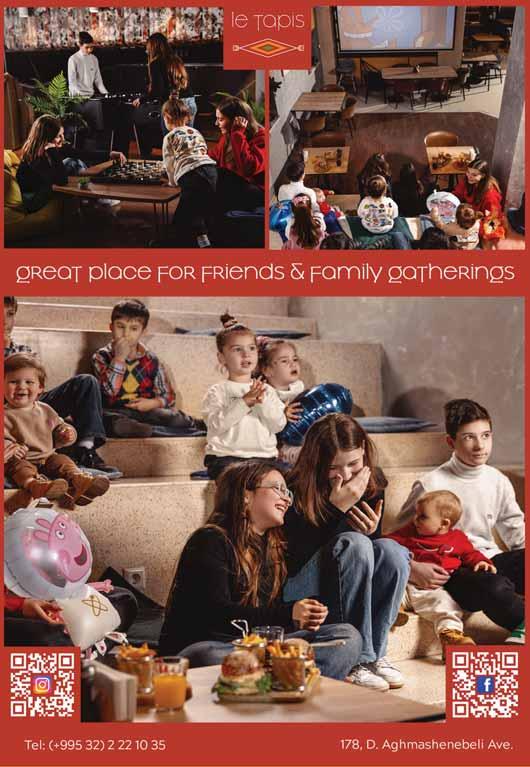
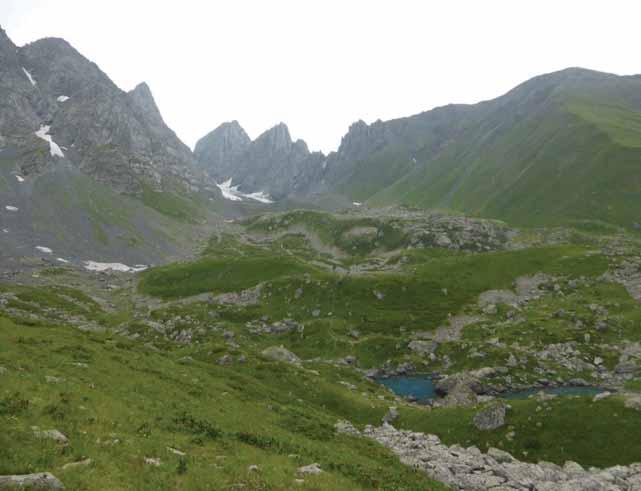 BY JIM HOLROYD
BY JIM HOLROYD
Imoved to Georgia from England in September 2009, the year after their short war with Russia.
Every year, I reflect on my living in Georgia- the country not the US state (it needs qualifying every time). I am often asked if I like Georgia. Well, my answer is “Yes and no”. Everywhere I have lived (England,
Wales, Australia, France and Georgia) has had positive and negative aspects. I’m sure there will be the inevitable few, who will repeat the tired old chestnut “if you don’t like, it go back to where you came from!“. On balance, I’d say I’m very happy here, and I have no plans to move. This is my own very personal viewpoint. I realize others will have different likes and dislikes, particularly with regards to the Khachapuri (cheese-bread)! I have also lived exclusively in the capital, Tbilisi,
One of the things my wife and I are able to do in Svaneti with some regularity is host volunteer teams of young people from all over the world, for a couple of weeks or more each time. We’ve had them since 2007 (Ushguli, from Bulgaria), mostly in Etseri where we have lived since 2012. From the Netherlands, Australia, South Africa, Argentina and more. They come to run children’s clubs and to help elderly or otherwise disadvantaged people in practical ways in the community. Our Ushguli team, in late October, nearly got snowed in. But they had time to handmake a slate stone path to the school in which I was about to start teaching English, and we left on time.
There’s always seasonal work: Shoveling snow off sticky roofs in late winter, otherwise they’ll collapse. Road-clearing in winter as well, most of it is plowed, but not all. Hoeing to plant potatoes in late spring, then the planting itself. Digging them up in October. Wood-cutting and splitting for firewood, anytime. Hayturning once it’s been scythed, to dry and stack for cows’ winter feed. Learning to milk cows, and helping with that, all the way through to making cheese. Special projects like assembling the huge playground I wrote about recently. Helping us, too, in our own large home, in many of the same ways. What they don’t know, they can learn. It’s always a help. This current team of five are with us for just over two weeks. They cook and
clean up after themselves in the upstairs kitchen, to reduce costs, as most such teams do. As I wrote before, their first big job upon arriving was to clean up the fully assembled playground set and level the ground around it; it’s a hit in the village, and we are so glad to be able to have been merely the channel through which it came and was set up. Wood work in two households has been multi-stage. Dragging pieces of a cut tree from the edge of a river, then taking the wood home. Chainsawing and axe splitting it, then stacking it where it’s out of wet weather, to dry fully for daily use. None of the team have done this kind of thing before, so they’re exercising muscles unused in such ways; but they are pledged to try practically anything, and cheerful about it too. I get them going, and they power through. They have also helped us with hoeing and weeding our garden, so all the various flowers, fruits and vegetables which my wife has sown can flourish in the relatively short growing season. (May we be protected from hailstorms! Rare up here, but we helplessly saw one once from the school windows, at the start of our Etseri years, which flattened our whole garden and everything else around as well. Very disheartening, and you just have to move on. Farming is this kind of dice-rolling game). In the autumn, there would be picking of pears and plums to do; earlier, cherries which are just now starting to become a regular thing (all of these if early spring frosts haven’t killed their flowers, more common than one would expect, though this year we got away with it).
There are enough people in the village living alone, elderly, physically chal-
is 5193m). As a draw-card, I think this is what would really attract tourists to Georgia.
GEORGIAN CUISINE
Georgians rave about their cuisine. One list places Georgian Cuisine as 4th out of 48 European cuisines, ranked behind only Italy, France and Spain. Can I say I am not a fan of khachapuri, their signature dish, a cheese filled pastry? I find it too salty. I do like khinkali (dumplings) and churchkhela (nuts wrapped in solidified grape juice), though.
Georgian meals are important events, and most birthdays and holidays are marked with a feast or “supra”. Georgians are also proud of their wine, and claim to have been the nation which invented wine back in the mists of time, some 8000 years ago, a claim for which there is substantial archaeological support in the region.
THE GEORGIAN LANGUAGE (დედა ენა)
which I appreciate is very different to living in a Georgian village.
LIGHT
I love the fantastic light. Lots of clear, sunny days make for good photos. Coming from England, where sunny days are rarer, this is a great blessing.
MOUNTAINS
The mountains are spectacular. Some are higher than any in the Alps (Mont Blanc is 4810m, Mount Shkhara in Svaneti
The language is a real nightmare for me, using a unique alphabet, and having long words with tricky consonant clusters. I lived in France for six years and can get by reasonably well in French, but Georgian is a different story. Maybe it is just that my brain isn’t as malleable as it once was. This year, I made a resolution to read a book in Georgian. For this, I chose Dumbadze’s famous “Granny, Iliko, Illarion and I” (მე, ბებია,
), but my progress is agonizingly slow.
Tbilisi feels like a safe city, I have had no troubles. Apparently it hasn’t always been so. In the 1990s, there was a lot of street crime. Walking around late at night in an English city on a Friday or Saturday night is far more intimidating than walking around Tbilisi at night.
Smoking is very common here. It is cheap compared to Western Europe, and many smokers seem oblivious to those around them. It pains me to see people smoking around children.
The public transport, though cheap, can be very overcrowded. The newer buses are better, with air conditioning and less pollution. There are just two metro lines, which don’t serve all parts of the city.
One thing that saddens me is that despite the Georgians singing so much that they are proud of their country, so many of them litter with abandon.
The traffic is scary at times, the drivers have little respect for pedestrians, and a disdain for lane markings. Also, drivers won’t necessarily stop just because you are on a pedestrian crossing. When asked by Georgians what I don’t like, I usually say “the traffic!” and they nod in agreement. Another gripe I have with the traffic is seeing far too many drivers using their mobile phones with seeming impunity.
Religion is important here. Despite the Bolsheviks’ attempt to stamp out religion in the 20th century, there are today many new churches, and most Georgians identify themselves as Orthodox Christians. I have been baptized into the Orthodox Church, but I find their intolerance of other denominations rather un-Christian, and so I feel I may be losing my religion. So, there you have it, my personal pros and cons of living in Georgia. I’ve been here over 14 years now, and I think, on balance, the positive aspects of living here far outweigh the negative.
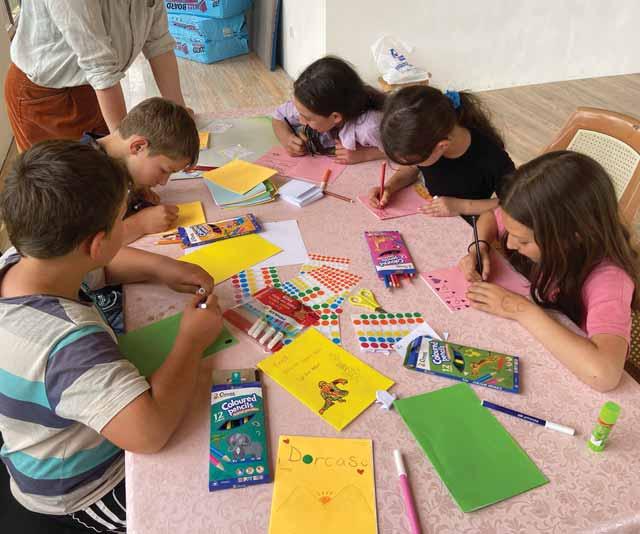
lenged, or otherwise, dependent on the goodwill of neighbors or relatives to lend a hand. Some are what I would call truly desperate, with too much to do just to survive, and not enough hands, energy or time. I suppose this is typical of subsistence-farming communities. Our teams seem to be able to make a difference, for
which we are glad to facilitate them and multiply whatever the two of us could do to benefit this village, which has, from the start, welcomed us and helped us get a start here.
Tony Hanmer has lived in Georgia since 1999, in Svaneti since 2007, and been a
weekly writer and photographer for GT since early 2011. He runs the “Svaneti Renaissance” Facebook group, now with over 2000 members, at www.facebook.com/ groups/SvanetiRenaissance/ He and his wife also run their own guest house in Etseri: www.facebook.com/hanmer.house.svaneti
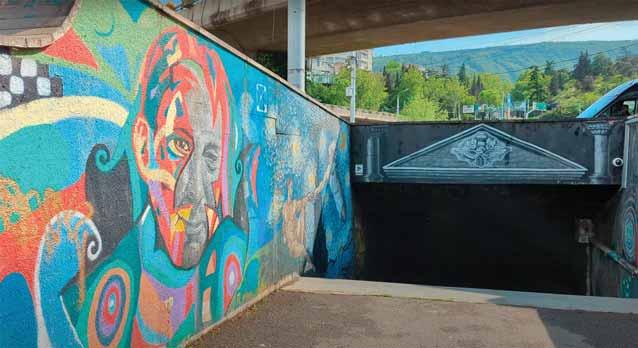 BY IVAN NECHAEV
BY IVAN NECHAEV
From March to May 2024, municipal services in Tbilisi completely painted over the graffiti and murals in the extensive network of underground passages on Heroes Square. This action destroyed several square meters of modern Georgian art, accumulated since 2017, that had been engaging in a dynamic dialogue. A pressing question now is whether the city administration plans to hold a competition to renew the street art, or if they intend to combat these vibrant expressions with white paint. This issue is critical not only for the future of Heroes Square, but also for understanding the near future of Georgia's social landscape.
THE SIGNIFICANCE OF STREET ART: UNDERSTANDING ITS IMPORTANCE
The emergence of graffiti and street art in Tbilisi is intricately woven into the fabric of Georgia's post-Soviet evolution. Following the collapse of the Soviet Union, Georgia underwent profound political, economic, and social transformations. The newfound freedom of expression provided fertile ground for artists to delve into themes previously censored or overlooked. Among the piv-
otal sites for this burgeoning public art form was the underground passage at Heroes Square, which became a critical platform for voices navigating and critiquing the rapidly shifting landscape of Georgian society.
Within the broader Georgian context, the underground passage at Heroes Square contributes significantly to ongoing dialogues on national identity and cultural heritage. The art adorning its walls frequently incorporates elements of Georgian history, folklore, and contemporary issues, creating a distinctive fusion of past and present. This synthesis actively shapes a modern Georgian identity that remains firmly rooted in tradition, while embracing new influences.
One of the most profound impacts of this art passage is its role in democratizing art itself. Unlike traditional forms confined to galleries and museums, street art is accessible to all. This inclusivity breaks down barriers between artists and the public, fostering a more engaged and participatory cultural experience. It challenges elitist perceptions of art, opening up space for diverse voices and perspectives to flourish.
Tbilisi's vibrant street art scene has transformed the city into a cultural magnet, drawing tourists from around the globe. This influx not only brings economic benefits but also promotes cultural exchange. Tourists engaging with the art
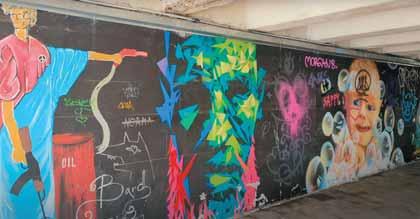
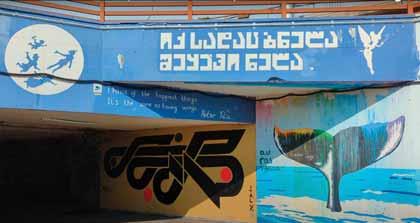
in the underground passage gain deeper insights into Georgian culture and history, while local artists are exposed to global artistic trends and ideas.
Furthermore, the artistic revitalization of the underground passage plays a crucial role in urban renewal. What might otherwise be a neglected or purely utilitarian space is transformed into a visually stimulating environment. This aesthetic enhancement enriches the urban experience for both residents and visitors, rendering public spaces more inviting and enjoyable.
The evolution of street art in Tbilisi, particularly at the Heroes Square passage, signifies far more than mere artistic expression. It encapsulates a journey of societal transformation, cultural introspection, and urban revitalization, embodying the essence of a city and its people moving forward while preserving their heritage.
THE PERILS OF DESTRUCTION: THE DANGER OF ERASING
The destruction of public art in the underground passage on Heroes Square has resulted in the loss of significant cultural heritage in Tbilisi. These artworks were not merely decorative; they were integral to the city's identity and historical narrative. Their removal has erased important cultural markers and diminished the richness of Tbilisi’s artistic heritage. Future generations are now deprived of the opportunity to connect with these expressions of their cultural past.
The public art in the underground passage served as a crucial platform for social and political expression. Its destruction has silenced these voices, removing a vital means of public discourse and protest. The loss of this space has limited the community's ability to engage with and challenge societal issues, resulting in a more subdued and less vibrant civic life.
Formerly fostering community cohesion by providing a shared space for artistic expression and dialogue, the destruction of public art has disrupted this sense of community. The loss of a communal gathering place where people could engage with art and with each other has negatively impacted social cohesion, reducing opportunities for collective experiences and cultural exchange.
Prior to its destruction, the transformation of the underground passage through art significantly enhanced the urban aesthetics of the area. Now, without these artworks, the space has reverted to a more sterile and less engaging environment. This loss is felt by both residents and visitors alike, diminishing the visual and cultural appeal of the city. The passage has lost its character and vibrancy, making it a less attractive and
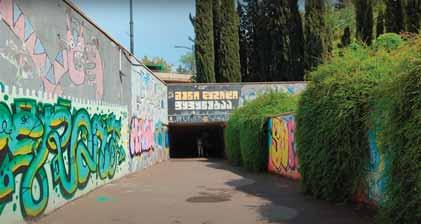
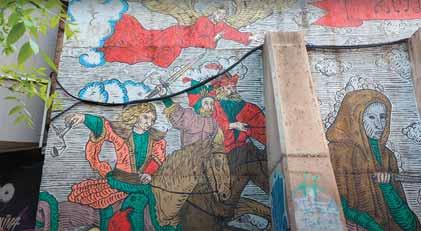
inviting space.
The destruction of public art in the Heroes Square passage has not only erased cultural heritage and silenced voices of expression but has also impacted community cohesion, urban aesthetics, and tourism. The loss of these artworks represents a setback for the city's cultural vibrancy and identity, highlighting the enduring significance of public art in shaping and preserving urban landscapes.
THE HISTORY OF SUPPRESSION: EXPLORING PAST ATTEMPTS TO BAN AND PAINT OVER STREET ART
Graffiti, often born from unauthorized acts, has long been perceived primarily as vandalism, rooted in a societal contract that prioritizes property rights and community order. Seen as a disruption to the aesthetic and functional harmony of public spaces, unauthorized graffiti is swiftly condemned as a violation of these principles.
Central to this perception is the "Broken Windows Theory," which argues that visible signs of disorder, like graffiti, can foster crime and antisocial behavior.
To uphold an image of control and safety, municipal authorities frequently resort to painting over graffiti, aiming to prevent further disorder and maintain community standards.
Moreover, graffiti's potential to devalue property and deter business investment prompts cities to allocate considerable resources to its removal. This economic rationale reflects a collective interest in safeguarding property values and enhancing urban aesthetics, crucial for attracting tourism and fostering commercial activity.
Public art remains subject to prevailing cultural and social norms within a community. Graffiti deemed offensive or inappropriate is swiftly removed to align with these norms, reflecting a broader societal contract that prioritizes majority sensibilities over individual expression.
EMBRACING CREATIVITY: THE SHIFT TOWARDS ENCOURAGING AND ALLOWING STREET ART
In contrast, sanctioned street art can enrich the cultural tapestry of a community. Murals and public art projects are increasingly encouraged as they celebrate local history, diversity, and crea-
tivity, fostering a shared cultural identity and bolstering community pride.
Cities worldwide, from Berlin to Miami, leverage street art as a tourist draw. Renowned street art can transform neglected areas into vibrant cultural hubs, stimulating local economies and enhancing urban vitality. Thus, promoting public art becomes a strategic maneuver to boost tourism and spur local business growth.
Street art also serves as a potent medium for social and political commentary. Encouraging such expressions provides a platform for marginalized voices, stimulating dialogue and raising awareness of pressing societal issues. This commitment resonates with democratic values and emphasizes the importance of free speech and civic engagement.
Public art initiatives frequently engage community participation, forging stronger social bonds and instilling a sense of ownership among residents. Collaborative murals and sanctioned graffiti walls channel creative energies constructively, engaging youth and discouraging illegal graffiti.
Strategically placed street art revitalizes urban areas, revitalizing blighted spaces into dynamic environments. This transformation aligns with broader urban planning goals aimed at enhancing resident quality of life and crafting aesthetically pleasing public spaces.
The coexistence of bans and encouragement of graffiti and street art underscores a complex social contract navigating competing interests and values. While the need for order, property rights, and economic stability drives the prohibition and removal of unauthorized art, recognition of art’s role in cultural enrichment, economic development, and social commentary fuels its promotion and integration into urban planning initiatives.
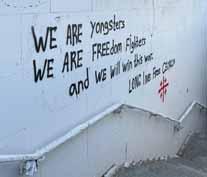
Elisabeth Leonskaja’s recital at the Toradze Festival 2024 was a masterclass in Beethoven interpretation. Her rendition of Beethoven’s late sonatas not only honored the composer’s genius, but also offered a deeply personal and reflective interpretation that resonated with all who were fortunate enough to attend.
BEETHOVEN’S MUSIC
MEETS ITS FINAL NOTE
As one of the most revered pianists of her generation, Leonskaja’s approach to Beethoven is marked by a profound understanding of the composer’s intentions, an ability to convey the emotional depth of the works, and a meticulous attention to the structural and technical details. Her engagement with Beethoven’s music reflects a deep reverence for the composer’s vision, balancing fidelity to the score with a personal interpretive touch. Leonskaja’s interpretations are always valuable for their clarity, structural coherence, and dynamic range.
Intellectual Depth: Leonskaja approaches Beethoven’s music with a scholarly rigor, understanding the historical and theoretical contexts of the works. She delves into the intricacies of Beethoven’s compositional techniques, ensuring that her performances are informed by a comprehensive grasp of the music’s underlying structures.
Emotional Resonance: Despite her analytical approach, Leonskaja never loses sight of the emotional core of Beethoven’s music. Her performances are imbued with a sense of passion and intensity that brings the composer’s emotional landscape to life. She has the rare ability to convey the full spectrum of human experience, from the depths of despair to the heights of joy.
Technical Mastery: Leonskaja’s technical prowess is evident in her command over the piano. She possesses a remarkable control over dynamics, phrasing,
and articulation, allowing her to navigate the technical challenges of Beethoven’s works with ease.
SONATA NO. 30 IN E MAJOR, OP. 109
Leonskaja’s interpretation of Op. 109 highlights the lyrical and contrasting elements of the sonata. The first movement, Vivace ma non troppo – Adagio espressivo, is approached with a delicate touch, emphasizing the song-like quality of the themes. Leonskaja’s sensitivity to the shifts between vivacious and contemplative passages showcases her ability to navigate Beethoven’s nuanced emotional landscape.
In the second movement, Prestissimo, Leonskaja demonstrates her technical agility and precision. Her playing is marked by a crisp articulation and a driving energy that captures the movement’s urgency. The final movement, Gesangvoll, mit innigster Empfindung, is rendered with a profound sense of introspection and serenity. Leonskaja’s ability to sustain a lyrical line and maintain a sense of continuity through the variations is particularly noteworthy.
SONATA NO. 31 IN A-FLAT MAJOR, OP. 110
Op. 110 is a work of deep emotional and structural complexity, and Leonskaja’s interpretation brings out its multifaceted character. The opening movement, Moderato cantabile molto espressivo, is played with a warm, singing tone that emphasizes the lyrical nature of the music. Leonskaja’s phrasing is expressive, bringing out the vocal qualities inherent in Beethoven’s writing.
The second movement, Allegro molto, showcases her rhythmic precision and dynamic contrasts. Leonskaja’s ability to convey the playful, almost scherzolike character of the movement adds a layer of charm to the performance. The final movement, Adagio ma non troppo – Fuga: Allegro ma non troppo, is a testament to her interpretive depth. The fugue, with its intricate counterpoint and emotional intensity, is rendered with clarity and coherence, highlighting Leon-
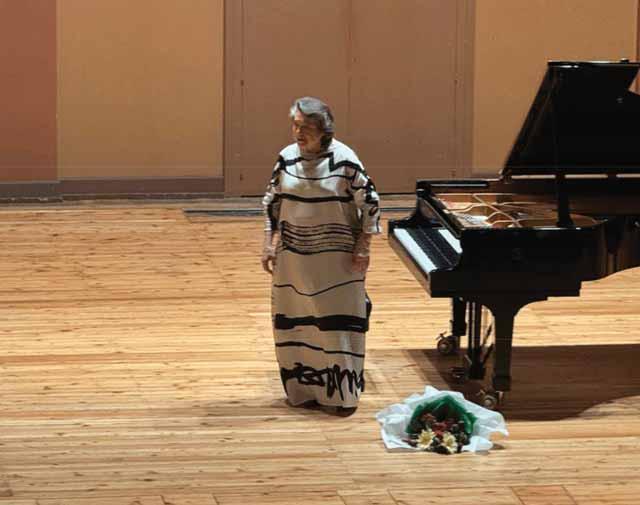
skaja’s intellectual engagement with the music.
SONATA NO. 32 IN C MINOR, OP. 111
Leonskaja’s performance of Op. 111 is marked by its dramatic intensity and spiritual depth. The first movement, Maestoso – Allegro con brio ed appassionato, is played with a powerful, commanding presence. Leonskaja captures the movement’s dramatic contrasts and rhythmic drive, bringing out the tension and resolution that characterize Beethoven’s late style. The second and final movement, Ari-
etta: Adagio molto semplice e cantabile, is where Leonskaja’s interpretive genius truly shines. Her playing is imbued with a sense of timelessness and transcendence, capturing the movement’s meditative and ethereal qualities. The variations unfold with a natural, organic flow, culminating in the serene and sublime final variation, which Leonskaja plays with a profound sense of inner peace and reflection.
RETURNING TO BRIDGE THE PATH
Leonskaja’s return to Tbilisi is symbolic of the enduring connection between the artist and her roots. Despite her international acclaim, this performance is a testament to her bond with her homeland and her contribution to its cultural enrichment. It underscores the notion that classical music, while universal, is deeply personal and rooted in the identity of both the performer and the audience. This recital also serves as an inspiration for young musicians in Georgia, demonstrating the heights that can be achieved with dedication and passion. Leonskaja’s journey from Tbilisi to global stages embodies a narrative of artistic excellence that can motivate and encourage emerging talent.
Summer has always been the time for celebrating vibrant color and opulent nature. The Marcel Ostertag Store that reopened in May this year in its new location in Berlin city-West is for sure the place to be for all fashion lovers. This is an avant-garde space, where fashion transcends boundaries with an eclectic collection of designer clothes. The two new collections by Marcel Ostertag: Flowers in the Dark 2024 and Over the Rainbow 2024, embrace the impressive spectrum, from pink pastels to dazzling rainbow hues adorned with bold floral prints. His extravagant, feminine and gender neutral designs highlight one's silhouette with tailored trousers, ethereal lace dresses, sleek coats and leather jackets and skirts. Visitors can also discover a harmonious blend of playful T-shirts with the message of hope and peace written across them, chic cargo trousers, and elegant dresses in greens and sunny yellows, as well as in soft pastel shades, perfect for the modern fashionista. In this space, where fashion history meets innovation in a symphony of color and design, the outfits span a radiant palette from soft pinks to iridescent rainbow hues, some pieces embellished with exotic floral prints evoke a sense
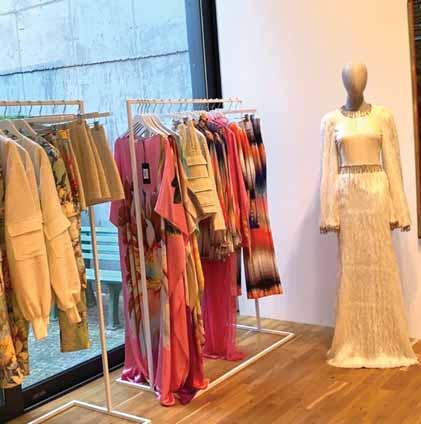
of wanderlust. The garments exude an extravagant and feminine allure. The timeless, classic dresses are reimagined with avant-garde zippers. In a nod to both tradition and contemporary style,
each piece is a testament to the evolution of fashion.
The Marcel Ostertag store opening was a true highlight, standing out prominently in Berlin's society calender
attracting a stunning crowd of models, actors, influencers, journalists and stylish good old West Berliners.
Marcel Ostertag is both a maker and a brand. He draws his inspiration from his headquarters in Berlin, with its vibrant streets and the dynamism of the city, which is characterized by the tension between traditional influences and modernity. The designer acquired his fashion expertise during his studies at the renowned Central St. Martin’s College in London, and refined his skills at numerous international collaborations and shows. He finally committed himself to his main values- sustainable production, high-quality materials and fair production conditions, when he founded his label Marcel Ostertag in 2006. The shop is located on Bleibtreustr. 1 | 10623 Berlin. Check out https://marcelostertag. com for more details.
And it is common knowledge that no outfit is complete without suitable jewellery. The Tbilisi-based Natka Davitelashvili Georgian brand that recently exhibited its hot and trendy pieces at the Maikunst Fest in Berlin, inspires with an exquisite new collection that masterfully intertwines history and craftsmanship. This array of jewelry features a stunning selection of earrings, crosses, chains, bracelets, and rings. Each piece is meticulously hand-made from precious metals, and adorned with lustrous pearls, alongside semi-precious stones like malachite, aquamarine, peridot, and
garnet. Drawing inspiration from the ancient Georgian tradition of Byzantine Christian jewelry and the timeless elegance of antique Greek adornments, this collection also celebrates the natural world with intricate turtle and other exotic animal motifs.
This seamless blend of historical influences creates a timeless fusion of elegance and organic beauty, making each piece a true work of art that honors both the past and the present. Davitelashvili's signature style is prominently showcased through the use of mineral stones, which are minimally worked to retain their original structure and form. This approach ensures that the natural beauty of the stones remains visible and seamlessly integrated into each design.
Jewelry has always been an essential accessory, transcending mere decoration to become a profound statement of personal identity and cultural heritage. From ancient times, precious gems and brooches have symbolized status, power, and beauty, playing a crucial role in human history. In Georgian cultural tradition and contemporary societies, tasteful bijoux enhances every outfit by adding a touch of sophistication and individuality, making it an indispensable element of fashion and self-expression. See more about the Natka Davitelashvili brand online on: www.e-mergingartists. art, and stay tuned for more hot fashion trend reviews as Berlin Fashion Week approaches. Enjoy the summer!
The ‘Evrovizion. Crossing Stories and Spaces’ exhibition is an evolving project that travels across Europe, incorporating local contributions to explore and expand the narrative of European identity. When the exhibition arrived in Tbilisi, Georgia, it included significant works by Georgian artists that offered unique perspectives and enriched the broader European discourse. The exposition is being held at the Tbilisi Photography & Multimedia Museum (TPMM) and is open to the public for free until July 21, 2024.
‘Evrovizion. Crossing Stories and Spaces’ is an innovative exhibition curated by Sabina Klemm and Sanja Kojic Mladenov, under the auspices of the Institut für Auslandsbeziehungen (ifa). This traveling exhibition delves into the contemporary social and political dynamics of Europe, particularly focusing on its less visible and marginalized geopolitical and cultural spaces. The exhibition has already visited several cities, and will continue its journey through various European locations until 2027. Each stop enriches the project with new local contributions, creating a dynamic and evolving narrative of European identity. The primary objective of ‘Evrovizion. Crossing Stories and Spaces’ is to explore and present the nuanced and often overlooked aspects of European identity. It seeks to engage with the concept of Europe not as a monolithic entity, but as a mosaic of diverse and sometimes conflicting narratives. The exhibition features themes related to migration, historical memory, and social justice, and addresses the idea of "semi-peripheries" and "places of diversity," focusing on regions that are frequently marginalized in mainstream cultural and political discourses. The exhibition's ability to adapt and incorporate local elements has made it a unique and engaging experience at each of its destinations. For instance, in Nicosia, the exhibition included new works by Greek Cypriot artist Kyriakos Theocharous and Turkish Cypriot artist Nurtane Karagil, curated by Maria Efstathiou. This local expansion not only enriched the exhibition but also sparked important conversations about identity and coexistence. The publication of the ‘Evrovizion’ magazine at each stop further documents and analyzes the impact of the exhibition. These magazines serve as an "archive of the journey," capturing the evolving dialogue and the exhibition's influence on the cultural identity of each host city. When the exhibition arrived in Tbilisi, Georgia, it was enriched with the contributions of Georgian artists Nika Kutateladze and Vajiko Chachkhiani. Their works brought unique perspectives to the exhibition, reflecting the cultural and social fabric of Georgia while resonating with broader European themes.
WHILE I AM AWAY’
Nika Kutateladze's installation, ‘To Protect My House While I Am Away,’ serves as a poignant metaphor for the themes
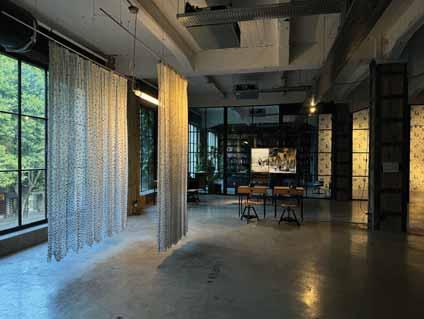
of home, community, and coexistence.
The artwork features a large curtain adorned with thorns, making it an untouchable barrier. This transformation of a familiar domestic symbol into something hostile and unapproachable speaks volumes about the changing dynamics within communities.
Kutateladze draws inspiration from his experiences in a depopulating Georgian village, capturing the essence of human interactions in small, close-knit communities. His work delves into the fragility of these bonds, highlighting how fear and mistrust can erode the foundations of communal living. The thorncovered curtain symbolizes a shift from mutual support to a celebration of others' misfortunes, inviting viewers to reflect on the darker aspects of shared existence.
This piece resonates deeply within the context of ‘Evrovizion,’ as it mirrors broader European concerns about social cohesion and the impact of socio-economic changes on traditional communities. Kutateladze's exploration of the human condition, through the lens of his local environment, offers universal insights that enhance the exhibition's narrative on European identity.
VAJIKO CHACHKHIANI: ‘GLASS BONES’ AND ‘SHIVERING HEART’
Vajiko Chachkhiani's contribution to the exhibition includes the video installation ‘Glass Bones’ and the film ‘Shivering
Heart,’ which are presented within a traditional Georgian wooden barn. ‘Shivering Heart’ is a modern adaptation of a Georgian folk tale about a young man named Sandro, his unrequited love for Elene, and the complexities of his relationship with his mother. This narrative explores themes of desire, love and manipulation, questioning concepts of identity, family, and belonging.
Chachkhiani's work links Georgian traditions and mythology with contemporary psychological states and emotions. Through subtle visual poetry, he creates interfaces between the tangible reality of the outside world and the inner workings of the human psyche. His adaptation of the folk tale serves as a metaphor for the struggle between personal desires and societal expectations, a theme that is both deeply personal and universally relatable.
The inclusion of Chachkhiani's work in ‘Evrovizion’ layers an understanding of how cultural narratives shape individual and collective identities. Chachkhiani's art underscores the exhibition's goal of presenting diverse and often marginalized voices within Europe, enriching the overall narrative with a distinctly Georgian lens.
FROM PREVIOUS REGIONS
Selma Selman's video performance ‘Viva La Vida’ is a powerful exploration of identity, heritage, and femininity from Bosnia and Herzegovina. In the perfor-
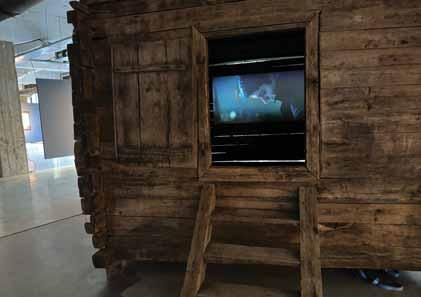
PUBLISHER & GM
George Sharashidze
COMMERCIAL
DEPARTMENT
Commercial Director: Iva Merabishvili
Marketing Manager: Natalia Chikvaidze
EDITORIAL DEPARTMENT:
Editor-In-Chief: Katie Ruth Davies
Journalists: Ana Dumbadze, Vazha Tavberidze, Tony Hanmer, Nugzar B. Ruhadze, Mariam Mtivlishvili, Erekle Poladishvili, Shelbi R. Ankiewicz Ivan Nechaev
Photographer: Aleksei Serov
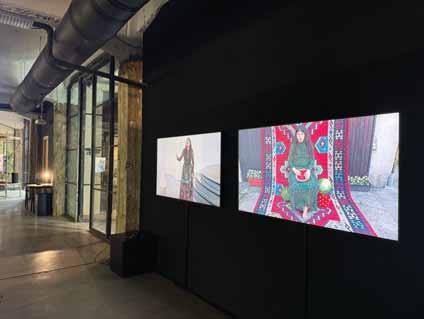
mance, Selman sits in a frontal position with a hanging carpet in the background. She meticulously hollows out a watermelon, eating its fruit and drinking its juice, while maintaining direct eye contact with the viewer. The composition, reminiscent of a living icon, is rich in symbolism.
Petrit Halilaj’s work is deeply rooted in the history and cultural tensions of his homeland, Kosovo. His installation ‘Poisoned by Men in Need of Some Love (Felis silvestris)’ is part of a series created between 2013 and 2019. The installation features a cat sculpture made from animal excrement and earth, placed within three open brass cubes. This series was inspired by Halilaj’s rediscovery of the animal collection from the former Museum of Natural History of Kosovo, which was locked away and forgotten when the museum was transformed into the Ethnological Museum Kosovo.
Henrike Naumann’s installation ‘TRIANGULAR STORIES’ utilizes 1990s furniture and interior decor to create a room where two video works, ‘Terror’ and ‘Amnesia,’ are shown. The videos transport viewers into the lives of teenagers in 1992, capturing contrasting aspects of youth culture during that period. ‘Amnesia’ reflects the hedonistic lifestyle of the early 1990s, depicting scenes of excessive partying and drug use in Ibiza. In contrast, ‘Terror’ is set in Jena, eastern Germany, and portrays violent assaults, nationalist chants, and
vandalism, reflecting the rise of far-right ideology among youth in the region. Naumann’s work explores themes of radicalization and the hedonistic drive for self-optimization, highlighting the social and political environment of the 1990s in eastern Germany.
Nevin Aladag’s works ‘Vibration III’ and ‘Percussion’ are part of her Social Fabric series, which utilizes various fragments of hand-knotted kilims, new wool and silk carpets, sisal rugs, and wool carpets. These fragments, sourced from diverse locations, are arranged in a collage, creating hybrid objects that resemble reliefs or picturesque musical compositions.
Slavs and Tatars' ‘Pickle Bar’ is an interactive installation that blends the concept of a Slavic aperitif bar with elements of cultural and political commentary. The bar serves as a space for engaging with pickled delicacies and Slavic aperitifs in a relaxed atmosphere, encouraging visitors to explore the boundaries and possibilities of language and cultural exchange.
Lana Cmajcanin’s wallpaper installation ‘BALKANGREUEL - BALKAN CRUELTY’ juxtaposes Viennese toile de Jouy designs with motifs from Gottfried Sieben’s graphic portfolio ‘Balkangreuel,’ published in 1909. This portfolio, created during the Austro-Hungarian annexation of Bosnia, depicts acts of barbarism by Balkan soldiers, reinforcing negative stereotypes about the Balkans.
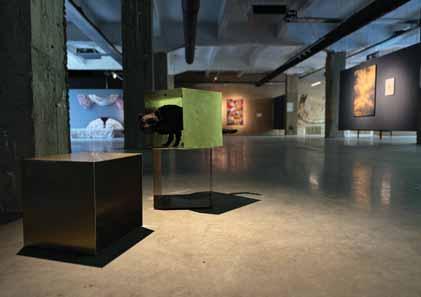
Website Editor: Katie Ruth Davies
Layout: Misha Mchedlishvili
Webmaster: Sergey Gevenov
Circulation Managers: David Kerdikashvili, David Djandjgava
ADDRESS
1 Melikishvili Str. Tbilisi, 0179, Georgia
Tel.: +995 32 229 59 19 E: info@georgiatoday.ge F: GeorgiaToday
ADVERTISING & SUBSCRIPTION
+995 555 00 14 46
E-mail: marketing@georgiatoday.ge
Reproducing material, photos and advertisements without prior editorial permission is strictly forbidden. The author is responsible for all material. Rights of authors are preserved. The newspaper is registered in Mtatsminda district court.
Reg. # 06/4-309
